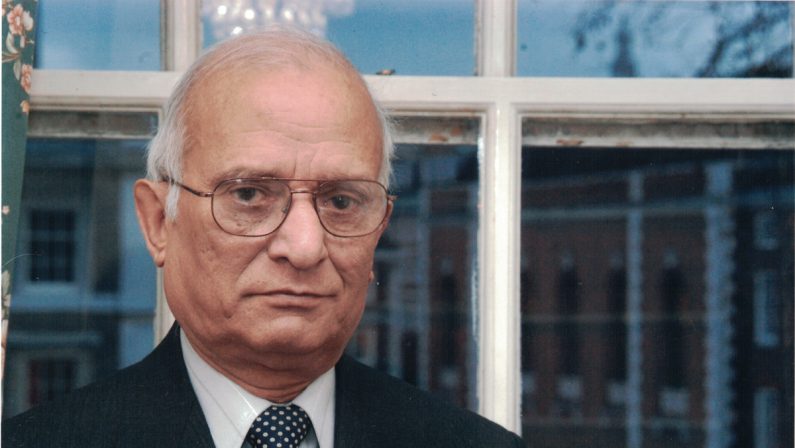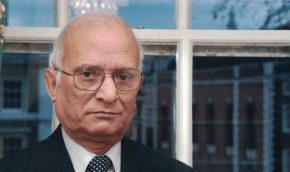Co-founder of the Society of Black Lawyers and Britain's first Muslim QC.
Celebrating Diversity at the Bar
- Introduction
- Diversity Timeline
- Edward Akufo-Addo
- Obafemi Awolowo
- Joyce Bamford-Addo
- Solomon Brandaranaike
- Charlotte Boaitey-Kwarteng
- Joseph Ephraim Casely Hayford
- Eugenia Charles
- S Chelvan
- Thomas Morris Chester
- Learie Constantine
- Edward Cragg Haynes
- Patricia Dangor
- Coomee Rustom Dantra
- Gifty Edila
- Ezlynn Deraniyagala
- Taslim Olawale Elias
- Martin Forde
- Arthur Dion Hanna
- Ma Pwa Hmee
- Alexander Isbister
- Sibghatullah Kadri
- Seretse Kharma
- Moleleki Didwell Mokama
- Tunde Okewale
- Ashitey Ollennu
- Vallabhbhai Patel
- Lily Tie Ten Quee
- Ponnambalam Ramanathan
- Edward Richards
- Khushwant Singh
- Manjiit Singh Gill
- Teo Soon Kim
- Leslie Thomas
- Stella Thomas
- Leonard Woodley
Home › Celebrating Diversity at the Bar › Sibghatullah Kadri
Sibghatullah Kadri QC
1937 - 2021
Call 1961, Inner Temple
Barrister, QC, Inner Temple Bencher, racial justice campaigner and co-founder of the Society of Black Lawyers, was born in Uttar Pradesh ten years before the partition of India. In late 1949, he moved with his entire family to Karachi in West Pakistan. Sharing a single room with his parents and seven siblings, he taught younger children to fund his own education, and enrolled for a chemistry degree in 1954.
At Karachi University, his scientific studies were soon complemented by broader political concerns. Elected head of the students’ union, he spoke up for constitutional democracy and civil rights during a volatile period of Pakistani history, and was among those detained after General Ayub Khan’s coup of 7 October 1958. Though he was released six months later (having learned to draft his own habeas corpus petition), the price was expulsion from university and exile to a city a hundred miles outside Karachi.
The move to London in November 1960 was an unhappy accident – occasioned by the need to visit a dying sister who was already in England – but it proved permanent. And the injustice he’d experienced under a military dictatorship now gave him a new focus: he would study law. In August 1961, The Inner Temple admitted Kadri despite his lack of a degree, on the basis that he shouldn’t suffer twice for his arbitrary imprisonment, and he began Part I of the Bar Exams. That was a part-time course in the 1960s, and it took him two years to sit the five papers, working as a postman, a clerk for a mail order firm specialising in ‘ladies slimming garments’, and a waiter at a Kilburn curry house. The third job was almost literally his last; it ended when a drunk customer refused to pay his bill and stabbed Kadri in the face. The racially motivated attack sent him to hospital for three weeks.
Not everything was that tough; 1963 was also the year that he married Carita Idman. The couple soon had two children, and to support his growing family, Kadri found work again. After contributing to the BBC as an ‘immigrant spokesman’ for the Campaign Against Racial Discrimination (an organisation established in 1964, soon after a visit to England by Martin Luther King), Kadri was offered a staff job at the Urdu Service.


Sibghatullah Kadri QC
In the autumn of 1968, Kadri was finally ready to study for the Bar Finals – and his year at the Council of Legal Education would be transformative. The CLE of the 1960s was structurally skewed to benefit British university graduates, and Kadri was soon articulating grievances that were widespread among Commonwealth students. Speeches propelled him to prominence, and a Bar Students’ Reform Committee, formed in September 1968, then staged a sit-in that made the front page and letters section of the Times. Kadri was promptly sacked by the BBC Urdu Service; when he turned up to read the news, his displeased boss said his services wouldn’t be required because ‘you are the news’. Most of the protesters’ demands weren’t met, but the BBC eventually relented and Kadri’s leadership was vindicated by the sit-in’s one durable success: the creation of representative student bodies at the Inns of Court. He was elected to be the first president of the Inner Temple Student Association, defeating John Laws (later, a Lord Justice of Appeal).
After leading a second CLE sit-in the following November – supported by fellow radicals who included the future Baroness Helena Kennedy and Jack Dromey MP – Kadri was called to the Bar. Early in 1970, he collaborated with two other barristers, Rudy Narayan and Byron Hove, to establish the very first organisation concerned with racism in the legal profession. The Society of Afro-Asian and Caribbean Lawyers (renamed the Society of Black Lawyers in 1981) aimed to eliminate racial discrimination among lawyers and to facilitate equal justice for all.
Kadri became headline news in April 1970. As legal adviser to the Pakistan Workers Association, he responded to the recent stabbing of a Bengali immigrant in London’s East End by rallying fearful Asians with reminders that the law allowed people to defend themselves. Likely victims of racist violence weren’t looking for trouble, Kadri told a Daily Telegraph reporter – ‘but they will be ready to deal with it.’ The forthrightness was too much for the BBC, which sacked him for a second time – on the grounds that it had ‘tread with the most extreme care’.
It wasn’t just the BBC that seemed to be more troubled by opposition to racism than by racism itself. Kadri obtained a pupillage under (Lord) Tony Gifford at Cloisters, but though he enjoyed several notable early successes, his outspokenness meant no chambers would offer him tenancy. Two years later, confident that this wasn’t for lack of ability, Kadri found a typically radical solution. Aged 35 and fresh out of pupillage, he set up the UK’s first multi-racial chambers at 11 King’s Bench Walk.
That was in March 1973. Over the next two decades, Kadri developed a practice that was all but defined by his commitment to equal rights. Along with immigration and judicial review challenges, he took on cases that were almost iconic: the defence of alleged rioters in Bristol and Brixton, for example, and members of the so-called ‘Bradford Twelve’ and ‘Newham Seven’, who were charged with defending their communities against violent racism. Working through bodies including the Society of Black Lawyers and the Standing Conference of Pakistani Organisations (SCOPO), Kadri combined lawyerly skills with a campaigner’s acumen. At a time when racist murders were multiplying across England, he mobilised beleaguered non-white communities in districts like Southall and Whitechapel; as a barrister, he regularly spoke out against racial bias among legal practitioners. As he recently described in a presentation to the Inner Temple, Lord Denning was among those admitted his mistakes; many did not.
In October 1981, Kadri addressed an international conference about race and the legal profession at Sussex University. His assessment of the situation in this country was bleak, but also impressive enough for Mr Justice Browne-Wilkinson (as he then was) to visit Kadri a day later at 11 Kings Bench Walk. Their constructive conversation led to the creation of a working committee on race relations chaired by Browne-Wilkinson. It evolved into a Race Relations Committee, and new anti-discrimination initiatives that are now institutionalised across the Bar.
In March 1989 Kadri took silk, and eight years later he was appointed a Bencher of the Inner Temple. Those are high honours, but a greater achievement is surely his lifelong pursuit of racial equality. In ways that were never easy, he pioneered essential reforms within a profession that is institutionally resistant to change, and sometimes hostile to it. Discrimination hasn’t vanished – as Kadri said in his recent Inner Temple presentation, ‘the struggle continues’ – but the trail he blazed has cleared obstacles for countless others who followed. In itself, that illustrates the value of diversity. His entire career also stands as a timely reminder that justice loses its meaning without lawyers prepared to fight for it.
Interviewed by Professor Judith Bourne